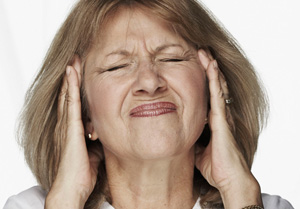 We often think of tooth loss as a natural function of aging and, to a certain degree that is true — years of wear and tear can diminish our enamel. But age alone is not the real culprit when it comes to tooth loss; rather it's our dental habits and age-related illnesses that play a bigger role. In fact, it is possible for people to keep all, or most, of their teeth well into their twilight years so long as they practice good dental hygiene. This is often easier said than done, however, as there are several factors that can prevent someone from taking proper care of their teeth.
We often think of tooth loss as a natural function of aging and, to a certain degree that is true — years of wear and tear can diminish our enamel. But age alone is not the real culprit when it comes to tooth loss; rather it's our dental habits and age-related illnesses that play a bigger role. In fact, it is possible for people to keep all, or most, of their teeth well into their twilight years so long as they practice good dental hygiene. This is often easier said than done, however, as there are several factors that can prevent someone from taking proper care of their teeth.
Disease and Dental Care
There are two age-related diseases with known links to dental health and tooth loss: diabetes and dementia.
Diabetes
According to the National Institute of Dental and Craniofacial Research, diabetics are at special risk for periodontal disease, which affects the gums and the bones that hold the teeth. The biggest complication of diabetes is dry mouth, which often occurs in the early stages before the disease is detected. Saliva does more than moisten your mouth, it also has enzymes that help you break down starches and help prevent bacteria from sticking to the teeth. When saliva production diminishes it causes ulcers and infections in the mouth, and can lead to tooth decay from increased bacteria levels.
Blood sugar is another major issue. Blood sugar can damage the blood vessels, reducing circulation to all parts of the body, including the teeth and gums. Without proper circulation, the teeth and gums won't get enough oxygen and nutrients, which can cause tissue death and eventual tooth loss.
Dementia
With dementia, it's not the physical changes within the body and mouth that are the issue, but rather mental changes that can have a profound effect on dental health.
In the early stages, people with dementia may be able to continue their daily routines, including dental hygiene. However, as the disease progresses, personal hygiene often falls by the wayside.
Dementia is not without its physical effects on the mouth, however, often the drugs prescribed to treat the mental and emotional symptoms of dementia can cause dry mouth, and the associated dental problems.
Other Factors
Disease is not the only factor when it comes to dental care in the elderly. Other factors include reduced mobility from injuries or wear and tear, making it difficult to stand at the bathroom mirror and brush; reduced fine motor skills, making it difficult to manipulate a toothbrush or provide enough pressure; and, pain form existing dental issues making it difficult to brush.
Solutions
If you are a caretaker for an elderly person, you probably already know what a challenge it can be to stay on top of personal hygiene. If the person is lucid, it's often difficult to broach the subject of hygiene because they may feel that they are being treated like a child. If they are not lucid, it's often difficult to broach the subject because they don't understand what's going on. Some resources suggest that the caregiver brush the person's teeth for them, but that can be difficult if the person is prone to irritability and biting.
In addition to difficulty with daily dental hygiene, it may also be difficult to even get them to the dentist for regular checkups. One solution is a home dental service. The mobile dentistry of In Home Dental Care includes treatment for patients with dementia and alzheimer’s as well as elderly, disabled, or infirm residents in assisted living or nursing home environments.
In-home Dental Care
As the name suggests, in-home dental care provides dental services to people in the comfort of their own homes, as well as in nursing homes and hospice. They are also called mobile dentists, and they are designed specifically to meet the needs of the elderly, who often have difficulty getting out to the dentist, and of caregivers who might not be trained to brush someone else's teeth.
In home dental services provide a wide range of services from yearly cleanings and screenings, to denture fittings, to daily or weekly hygiene visits. The goals of these services are to make dental health accessible to the elderly in order to improve their overall health and quality of life, and to do so without the stress of having to travel to the dentist's office. In home dental care also provides benefits to caretakers because it gives them more time to take care of themselves.
You can find an in home dental service in your area by searching the department of health website in your area, checking with your dental insurance company, or contacting local agencies for the aged.







